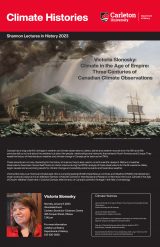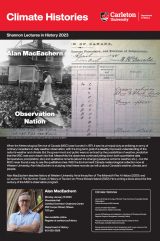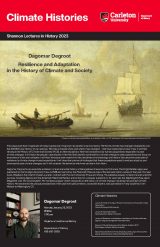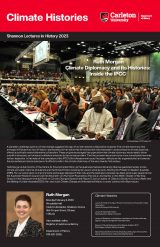Shannon Lectures, Winter 2023
Convenor: Professor Joanna Dean, Department of History, Carleton University.
Climate Histories
A series of Monday night lectures on the history of weather and climate, held at 7 PM Carleton Dominion-Chalmers Centre, 355 Cooper St., Ottawa, or online. Sponsored by the Shannon Endowment through the Department of History, Carleton University. Co-presented with the support of the Department of Geography and Environmental Studies.
Registration is recommended.
January 9: Climate in the Age of Empire: Three Centuries of Canadian Weather Observations
7 PM Carleton Dominion-Chalmers Centre, 355 Cooper St., Ottawa
Victoria Slonosky, McGill University
 Canada has a long scientific heritage in weather and climate observations. Letters, diaries and weather records from the 18th and 19th centuries tell us not only about the weather, but about the people, relationships and networks that existed in North America and Europe. They reveal the history of theories about weather and climate change in Canada as far back as the 1740s.
Canada has a long scientific heritage in weather and climate observations. Letters, diaries and weather records from the 18th and 19th centuries tell us not only about the weather, but about the people, relationships and networks that existed in North America and Europe. They reveal the history of theories about weather and climate change in Canada as far back as the 1740s.
These records are not only interesting for the history of science: they’re also used in current scientific research. Millions of weather observations have been transcribed thanks to citizen science during the 2010s: analysis of these observations for the St-Lawrence Valley region reveals some surprising results for climatic change and variability, extreme events and hazardous weather.
Biography:
Victoria Slonosky is an historical climatologist. She is currently leading McGill’s Data Rescue: Archives and Weather (DRAW) interdisciplinary citizen science project and is an affiliated member of McGill’s Centre for Interdisciplinary Research on Montreal. Her book, Climate in the Age of Empire: Weather Observers in Colonial Canada, tells the story of Canada’s scientific heritage in the field of climatology.
January 16: Observation Nation
7 PM Carleton Dominion-Chalmers Centre, 355 Cooper St., Ottawa
Alan MacEachern, Western University
 When the Meteorological Service of Canada (MSC) was founded in 1871, it saw its principal duty as enlisting an army of ordinary Canadians in daily weather observation, with the long-term goal of a steadily improved understanding of the nation’s weather and climate. But the government and public were so enticed by the possibilities of weather prediction that the MSC was soon drawn into that. Meanwhile, the observers continued jotting down both quantitative data (temperature, precipitation, etc.) and qualitative remarks (about the changing seasons, extreme weather, etc.) … but the MSC never found a way, or the time, to use the qualitative ones. With the Environment Canada meteorological collection now at Western University, Alan MacEachern is studying what these records can tell us about Canada’s weather, climate, and people.
When the Meteorological Service of Canada (MSC) was founded in 1871, it saw its principal duty as enlisting an army of ordinary Canadians in daily weather observation, with the long-term goal of a steadily improved understanding of the nation’s weather and climate. But the government and public were so enticed by the possibilities of weather prediction that the MSC was soon drawn into that. Meanwhile, the observers continued jotting down both quantitative data (temperature, precipitation, etc.) and qualitative remarks (about the changing seasons, extreme weather, etc.) … but the MSC never found a way, or the time, to use the qualitative ones. With the Environment Canada meteorological collection now at Western University, Alan MacEachern is studying what these records can tell us about Canada’s weather, climate, and people.
Biography:
Alan MacEachern teaches history at Western University. He is the author of The Miramichi Fire: A History (McGill-Queen’s, 2020) and co-author of The Summer Trade: A History of Tourism on Prince Edward Island (McGill-Queen’s, 2022). He is writing a book about the first century of the MSC’s observation program.
January 23: Resilience and Adaptation in the History of Climate and Society
Online lecture
Dagomar Degroot, Georgetown University
 The cause and likely magnitude of today’s global warming have no parallel in human history. Yet Earth’s climate has changed repeatedly over the 300,000-year history of our species. This talk will explain how and when it has changed – and how researchers know it has. It will then introduce the History of Climate and Society (HCS), an interdisciplinary field that considers how human populations responded to past climate changes. It will describe popular case studies in the field that identify vulnerability to climate change in past populations and focus on examples of crisis and collapse. It will then introduce new research in the disciplines of archaeology and history that uncovers examples of resilience to climate change in past populations. It will describe a series of strategies that these populations used to endure, adapt to, and even exploit past climate changes, and it will consider the extent to which we can learn from them.
The cause and likely magnitude of today’s global warming have no parallel in human history. Yet Earth’s climate has changed repeatedly over the 300,000-year history of our species. This talk will explain how and when it has changed – and how researchers know it has. It will then introduce the History of Climate and Society (HCS), an interdisciplinary field that considers how human populations responded to past climate changes. It will describe popular case studies in the field that identify vulnerability to climate change in past populations and focus on examples of crisis and collapse. It will then introduce new research in the disciplines of archaeology and history that uncovers examples of resilience to climate change in past populations. It will describe a series of strategies that these populations used to endure, adapt to, and even exploit past climate changes, and it will consider the extent to which we can learn from them.
Biography:
Dagomar Degroot is an associate professor of environmental history at Georgetown University. His first book, The Frigid Golden Age, was published by Cambridge University Press in 2018 and named by the Financial Times as one of the ten best history books of that year. His next book, Ripples in the Cosmic Ocean, is under contract with Harvard University Press and Viking. He publishes equally in historical and scientific journals, including Nature and the American Historical Review, and writes for a popular audience in, for example, the Washington Post, Aeon Magazine, and The Conversation. He maintains popular online resources on the history of climate change, including the podcast Climate History. He has shared the unique perspectives of the past with policymakers, corporate leaders, and journalists in many countries, from Wuhan to Washington, DC.
February 6: Climate Diplomacy and its Histories: Inside the IPCC
7 PM Carleton Dominion-Chalmers Centre, 355 Cooper St., Ottawa
Ruth Morgan, Australian National University
 A planetary challenge such as climate change suggests the logic of an international collaborative response. The climate diplomacy that emerged at Fukuyama’s ‘end of history’ was founded on the notion that its technocratic internationalism, underpinned by climate expertise, offered a politically neutral alternative to liberalism. These origins encouraged the expectation that climate diplomacy would neatly follow scientific advances, and produce multilateral solutions to the climate problem. That this process has proven to be more complicated warrants further inspection. In the wake of the conclusion of the IPCC’s Sixth Assessment cycle, this paper reflects on this organisation’s turn towards the humanities and social sciences in its efforts to inform the climate diplomacy of the early twenty-first century.
A planetary challenge such as climate change suggests the logic of an international collaborative response. The climate diplomacy that emerged at Fukuyama’s ‘end of history’ was founded on the notion that its technocratic internationalism, underpinned by climate expertise, offered a politically neutral alternative to liberalism. These origins encouraged the expectation that climate diplomacy would neatly follow scientific advances, and produce multilateral solutions to the climate problem. That this process has proven to be more complicated warrants further inspection. In the wake of the conclusion of the IPCC’s Sixth Assessment cycle, this paper reflects on this organisation’s turn towards the humanities and social sciences in its efforts to inform the climate diplomacy of the early twenty-first century.
Biography:
Ruth Morgan is the Director of the Centre for Environmental History at the Australian National University. She has published widely on the climate and water histories of Australia and the British Empire, including her award-winning book, Running Out? Water in Western Australia (2015). Her current project, on environmental exchanges between British India and the Australian colonies, has been generously supported by the Australian Research Council and the Alexander von Humboldt Foundation. She was a Lead Author on the Water chapter in Working Group II of the Intergovernmental Panel on Climate Change’s Assessment Report 6, and co-author of Cities in a Sunburnt Country: Water and the Making of Urban Australia (Cambridge University Press, 2022). Her next book Climate Change and International History is under contract with Bloomsbury.